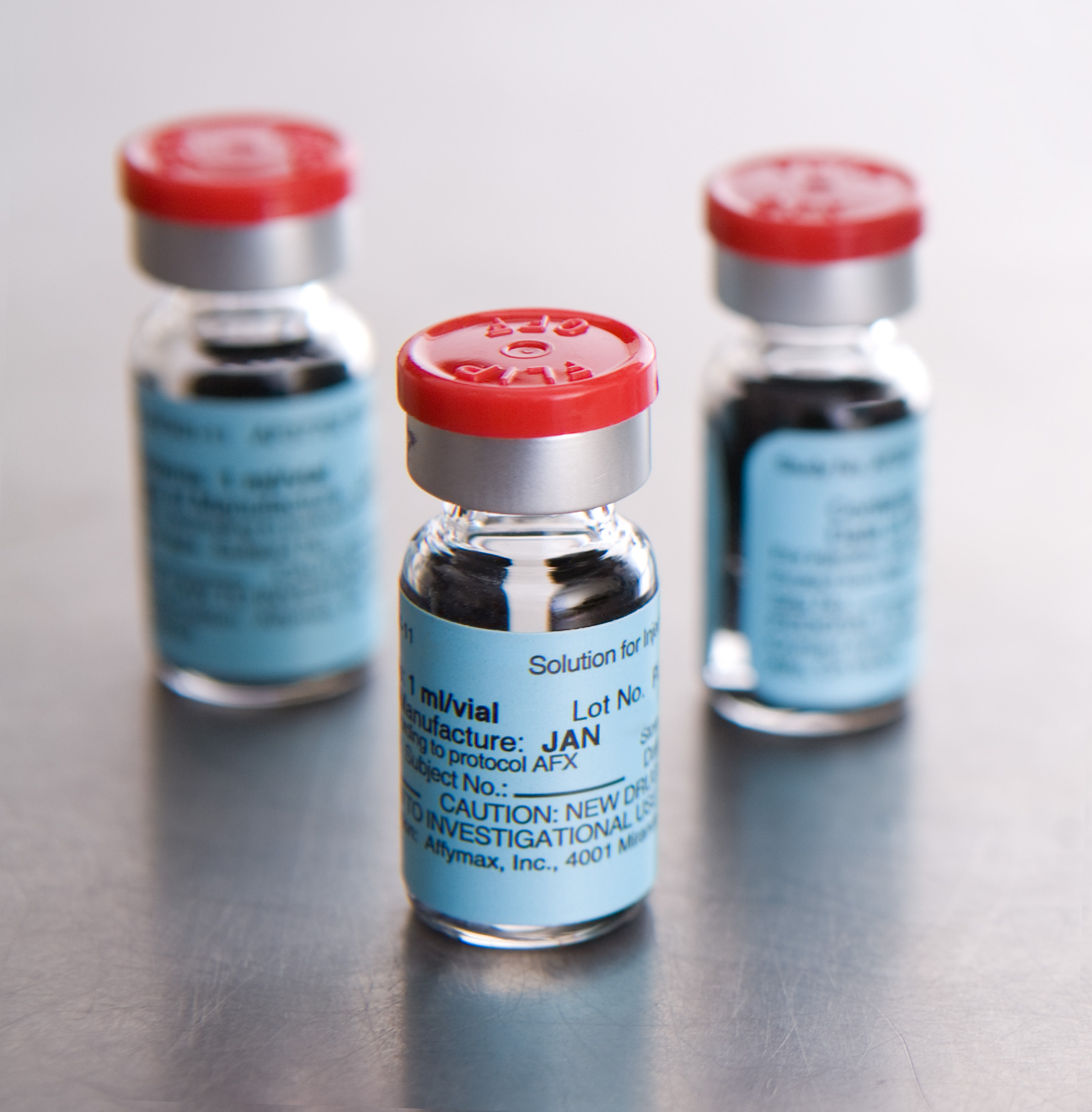Peginesatide用於治療慢性腎臟疾病貧血是安全且有效的
By Deborah Brauser
Medscape Medical News
April 20, 2010 (Orlando, Florida) — Peginesatide (Hematide, Affymax), an investigational peptide-based erythropoiesis-stimulating agent (ESA), given once monthly, is effective and tolerable in treating anemia in patients on hemodialysis. Combined results from 2 phase?2 studies and 2 ongoing long-term extension studies presented here at the National Kidney Foundation (NKF) 2010 Spring Clinical Meetings demonstrate the efficacy of the new drug.
"Hematide is the first synthetic peptidic ESA currently in phase?3 development for the treatment of anemia associated with [chronic kidney disease]," reported lead investigator Brigitte Schiller, MD, nephrologist and chief medical officer at Satellite Healthcare in Mountain View, California.
"We are always looking into ways to improve outcomes for dialysis patients, including ways we can decrease the amount of labor used to administer drugs, so that we can ultimately improve direct patient care through time gain," she added. "So we are very intrigued to have potentially a long-acting ESA that promises to be given only once a month."
Hemoglobin Levels Maintained
A total of 100 hemodialysis patients (55% male; mean age, 57.5 years; 50% black, 37% white, 13% Hispanic) with stable hemoglobin levels (mean, 11.6?g/dL) who were taking epoetin alfa were enrolled in the initial studies and treated with peginesatide once monthly for 24 weeks.
The patients who went on to participate in 1 of the 2 open-label extension studies, lasting up to 30 more months (mean exposure, 2.2 years), continued receiving peginesatide; dose adjustments were made as needed to maintain a 10 to 12?g/dL hemoglobin level.
The results showed that the mean hemoglobin levels were maintained within 1?g/dL of baseline levels for the full 36 months.
In addition, "median peginesatide doses remained relatively stable over 36 months of treatment," reported Dr. Schiller.
Although adverse events were reported for 93 patients, only 9 of these events were considered to be possibly related to the study drug. These included hypertension, anxiety, dizziness, dyspnea, leukopenia, and decreased red blood cell count.
Of the 70 patients reporting serious adverse events, only 1 event (fatal pulmonary embolism) was considered to be possibly related to peginesatide.
Finally, 29 patients received transfusions during the course of the studies, 59% of which were considered to be due to concurrent events, such as surgery and gastrointestinal bleeding, and none of the patients developed treatment-specific antibodies.
"The safety profile of peginesatide appeared consistent with that of marketed ESAs, so the adverse events were pretty much what were expected," said Dr. Schiller.
"Overall, these are preliminary data," she added. "The phase?3 trials have just been finished and data analysis is on the way. But so far, I think, [this drug] has shown that it can maintain hemoglobin over an extended time."
"I'd say the number?1 takeaway message is that there is the potential that a long-acting ESA may come to market in the United States. I'm very hopeful," said Dr. Schiller.
Preliminarily Optimistic
"Overall, my impression is that this offers another alternative as an [ESA]. In the era of bundling, with there being perhaps less dosages needed with [peginesatide], this might be an important medication for us to think about," said NKF program cochair Michael Choi, MD, associate professor of medicine at Johns Hopkins University School of Medicine in Baltimore, Maryland, and vice chair of education for the NKF Kidney Disease Outcomes Quality Initiative.
Peginesatide might prevent "some of the very rare reactions [that occur] with some of the other synthetic [ESAs], where antibodies can be formed," added Dr. Choi, who was not involved with this study. "This will prevent that, theoretically, and, at least in this poster, it seems like it's doing pretty well."
"Preliminarily, it seems that it will give us something else on our list of medications that we may be able to use to combat anemia. So we're eagerly awaiting the [phase?3] results," he concluded.
These studies were supported by Affymax and Takeda Pharmaceutical Company. Dr. Schiller and Dr. Choi disclosed no relevant financial relationships.
National Kidney Foundation (NKF) 2010 Spring Clinical Meetings: Abstract Poster?161. Presented April?14, 2010.
【24drs.com】April 20, 2010 (佛州奧蘭多)- Peginesatide(Hematide,Affymax)一種研究中胜肽為主的紅血球生成刺激藥物(ESA),一個月投予一次,對於治療接受透析的貧血患者是有效且可耐受的。發表在國家腎臟基金會(NKF)2010年春季臨床會議上的兩項第二期臨床研究與兩項進行中的長期展延研究,顯示出這個新藥的效果。
主要研究者、來自加州山景西雅圖健康照護中心醫療辦公室主任、同時也是腎臟科醫師的Brigitte Schiller報告,Hematide是第一個合成胜肽型ESA,目前正在第三期臨床研究中,發展作為治療與慢性腎臟疾病有關的貧血。
她附帶表示,我們現正研究如何改善透析患者的預後,包括我們可以降低用於投予藥物的人力,最終,我們將可以透過節省時間而改善病患的照護。因此,長效ESA可以一個月投予一次,引起了我們很大的興趣。
【維持血紅素濃度】
總共有100位透析患者(55%為男性,平均年齡為57.5歲;50%為黑人、37%為白人、13%為西班牙裔),這些病患血紅素濃度穩定(平均11.6 g/dl),他們正在使用epoetin alfa,被收納到起始研究中,並接受peginesatide一個月一次,共24週。
繼續參與兩項開放標記其中一項展延研究的病患,繼續接受peginesatide達30個月以上(平均暴露時間為2.2年);調整劑量維持血紅素濃度介於10到12 g/dl之間。
這些研究結果顯示,在36個月之間,平均血紅素濃度維持在1 g/dl差異之間。
Schiller醫師表示,除此之外,平均peginesatide劑量在36個月治療之間維持相對穩定。
雖然有93位病患報告不良反應,但只有9位被認為可能與試驗藥物有關;這些不良反應包括高血壓、焦慮、頭暈、呼吸困難、白血球低下以及紅血球數量變少。
70位報告有嚴重不良反應的病患中,僅有1位(致命性肺栓塞)可能與peginesatide有關。
最終,29位在研究期間接受輸注的病患,59%被認為與同時發生的事件有關,例如手術、或是腸胃道出血,且沒有任何病患發生對治療專一性的抗體。
Schiller醫師表示,peginesatide的安全性數據顯然與市面上的ESA差不多,因此不良反應與我們所預期的相當。
整體來說,這些是初期研究結果。第三期臨床研究才剛完成,正在進行數據分析。但是目前為止,我想(這個藥物)已經顯示出可以在長時間維持血紅素濃度。
Schiller醫師表示,我會說第一個要帶回的訊息是,長效型ESA很有潛力在美國上市。我抱持著很高的期待。
【初期是樂觀的】
NKF計畫共同主席、馬里蘭巴爾的摩約翰霍普金斯大學醫學院副教授、也是NKF腎臟疾病品質行動教育副主席Michael Choi博士表示,整體來說,我的看法是,這提供了ESA的另一個選擇。在匆忙的環境下,peginesatide或許僅需要比較少的劑量,這對我們來說可能是個重要的藥物。
Choi博士附帶表示,Peginesatide可能預防發生在其他合成ESAs上很罕見的反應,形成抗體;Choi並未參與這項研究。這理論上將可以避免那樣的事件,且在壁報的最後,看起來是很好的。
他的結論是,初期來看,這個藥物似乎給了我們一些在清單以外的選擇,我們可能可以使用它來對抗貧血。因此正等待第三期臨床研究結果。
這些研究接受Affymax與Takeda藥廠贊助。Schiller醫師與Choi博士表示沒有相關資金上的往來。





 留言列表
留言列表
 線上藥物查詢
線上藥物查詢 